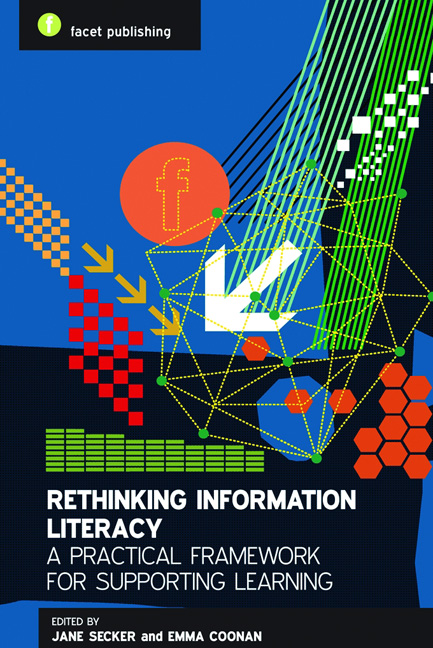Book contents
- Frontmatter
- Contents
- Acknowledgements
- Contributor profiles
- Introduction
- Strand One Transition from school to higher education
- Strand Two Becoming an independent learner
- Strand Three Developing academic literacies
- Strand Four Mapping and evaluating the information landscape
- Strand Five Resource discovery in your discipline
- Strand Six Managing information
- Strand Seven The ethical dimension of information
- Strand Eight Presenting and communicating knowledge
- Strand Nine Synthesizing information and creating new knowledge
- Strand Ten The social dimension of information
- Afterword: ‘Ownership is a flawed concept’
- Conclusion
- Appendix 1 A New Curriculum for Information Literacy (ANCIL): the curriculum
- Appendix 2 ANCIL Lesson Plan
- Appendix 3 ANCIL Institutional Audit: worksheet
- Appendix 4 ANCIL Institutional Audit: interview questions
- Index
- Miscellaneous Endmatter
- Miscellaneous Endmatter
- Miscellaneous Endmatter
- Miscellaneous Endmatter
Strand Seven - The ethical dimension of information
Published online by Cambridge University Press: 08 June 2018
- Frontmatter
- Contents
- Acknowledgements
- Contributor profiles
- Introduction
- Strand One Transition from school to higher education
- Strand Two Becoming an independent learner
- Strand Three Developing academic literacies
- Strand Four Mapping and evaluating the information landscape
- Strand Five Resource discovery in your discipline
- Strand Six Managing information
- Strand Seven The ethical dimension of information
- Strand Eight Presenting and communicating knowledge
- Strand Nine Synthesizing information and creating new knowledge
- Strand Ten The social dimension of information
- Afterword: ‘Ownership is a flawed concept’
- Conclusion
- Appendix 1 A New Curriculum for Information Literacy (ANCIL): the curriculum
- Appendix 2 ANCIL Lesson Plan
- Appendix 3 ANCIL Institutional Audit: worksheet
- Appendix 4 ANCIL Institutional Audit: interview questions
- Index
- Miscellaneous Endmatter
- Miscellaneous Endmatter
- Miscellaneous Endmatter
- Miscellaneous Endmatter
Summary
Where Strand Three aims to articulate, explore and develop the academic literacies of reading and writing within the student's disciplinary context, Strand Seven builds upon these competences to explore ethical values around information use. This includes ‘need-to-know’ issues such as referencing and attribution, plagiarism, copyright and intellectual property guidelines; however, it also opens the way for rich discussion around where the borderline between bad scholarship and unethical or illegal behaviour lies. This approach creates opportunities for students to move beyond black-and-white usage guidelines and towards an informed and nuanced appreciation of the ethics of information.
Lyn is Secretary of the CILIP Information Literacy group and a member of the Universities UK (UUK) Copyright Working Group. She took part in the ANCIL expert consultation which helped inform and shape the final curriculum. Specializing in copyright, intellectual property and learning and teaching developments at Sheffield University, Lyn's expertise in the ethical aspects of information literacy made her the natural choice for a Strand Seven case study.
Institutional context
The University of Sheffield is in the Top Ten of the Russell Group of leading research-intensive universities and was named ‘University of the Year’ 2011 in the Times Higher Education awards. The priority themes of the university's Learning and Teaching Strategy 2011–16 include internationalization, employability, research-led learning and developing communities of learning. The University Library has aligned its Strategic Plan and Objectives with those of the university. Within Learning and Teaching, the aim is to work in close partnership with departments to embed information literacy into the curriculum while engaging students in an understanding of their transferable skills. The university has the aspiration that all Sheffield students should be information literate when they graduate. Faculty librarians liaise with course leaders to design appropriate activities and assessment to ensure this is achieved.
This case study reflects on various projects at the university which come under the heading of ethical use of information. It starts with the development of an online plagiarism tutorial and quiz, which supports the university's Unfair Means policy and guidance; shows the need for increased copyright awareness among both staff and students, and how this has been achieved through the development of a Copyright Hub, bringing together guidance from various departments within the University;
- Type
- Chapter
- Information
- Rethinking Information LiteracyA practical framework for supporting learning, pp. 79 - 94Publisher: FacetPrint publication year: 2012



